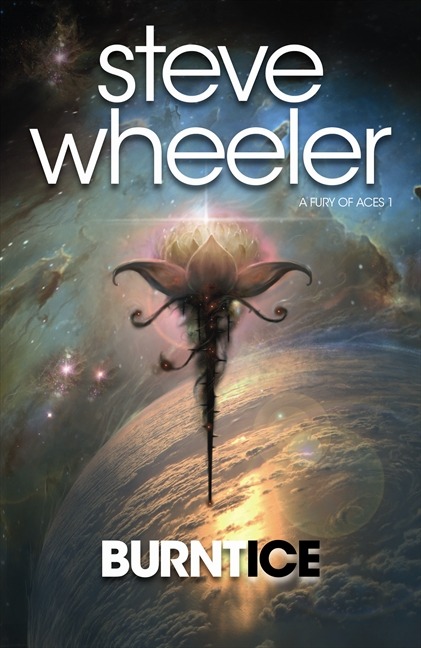 Burnt Ice, the first in the A Fury of Aces series, is Steve Wheeler’s debut novel. I was really excited to read a new ANZ science fiction novel since there are so few of them being published, especially by large publishers (this one is from Harper Voyager, if you’re wondering). And it has such a lovely cover, too (so much SF coming out of the US has unappealing covers with artwork ruined, in my opinion, by unpleasant typography).
Burnt Ice, the first in the A Fury of Aces series, is Steve Wheeler’s debut novel. I was really excited to read a new ANZ science fiction novel since there are so few of them being published, especially by large publishers (this one is from Harper Voyager, if you’re wondering). And it has such a lovely cover, too (so much SF coming out of the US has unappealing covers with artwork ruined, in my opinion, by unpleasant typography).
When I picked up Burnt Ice, I was expecting something like a Sean Williams and/or Shane Dix novel, but that wasn’t what I got.
Burnt Ice follows the adventures and misadventures of a military engineering crew in a distant future where wars are called “conflicts” and are sanctioned by the ever-watching Games Board. Of course, only part of the story revolves around the Games Board. The novel is actually structured as four almost self-contained stories with different but related missions at their centre. The over-arching plot holds everything together, even if at times it’s not obvious how the current conflict connects.
The plot was solid and fast-paced without a dull moment. New dangers kept arising and the crew’s missions took them to interesting places. The world building was also fairly strong, especially the planet at the start, which I enjoyed reading about. I also liked that there were aliens they didn’t know much about that popped up to cause trouble every now and then.
The writing was heavy on the technobabble, which I didn’t mind, although at times every new procedure was described in a bit too much technical detail. It didn’t bother me at first, but it got a bit much towards the end. On the other hand, the science and pseudoscience didn’t make me angry with it’s lack of credibility (as in, it was mostly correct and at least semi-viable), so that’s always a plus.
There were some things that did bother me, however. The characters were not very well developed and, especially in the first half or so when the focus was on the core crew, it wasn’t that easy to distinguish between them. The characters that stood out were basically Marko, the mainest character, Fritz, The Oddball Genius, and Jan, The (Mysterious) Girl. The other two crew members didn’t read terribly differently to Marko. Very little time was spent developing the personalities and relationships between them to the point where, for example, we’re told when there’s a romantic connection but no reason is really given for it and I was left wondering why those two would even want to hook up. The characters that came along later on were more distinct and interesting, but they weren’t further developed either. It would have been a stronger novel if some of the technobabble were exchanged for some character development.
Easily my favourite character was the sentient ACE (Artificially Created Entity) soft-of-pet Marko built for himself in the latter half of the book. Basically an animal cyborg, it’s quirky lack of understanding of human idioms gave me a couple of laughs. It wouldn’t really have meshed with the plot earlier on, but I do wish it had come along sooner.
The other thing that bothered me was the unnecessary (and I assume unconscious) use of gendered slurs. For example “arrogant woman/bitch” was used two too many times. In an ostensibly gender-equal world, it felt like everyone who screwed up and more than half the dodgy people (as in bad guys, but there were shades of grey and mystery to some of them) were female or AIs. I was particularly offended when someone called the suddenly rogue AI a f*cking bitch (the swearing I don’t object to because the AI was trying to kill them). Even though the AIs were loosely gendered, you can’t get much more asexual than a computer so you’d think notions of gender would have been redefined by that distant future point. As I said, I very much doubt it was intentional sexism, but that doesn’t mean it didn’t bother me.
The ending was very much an ending to part one in a series. There were a lot of unanswered questions, including some mysterious new characters who showed up towards the end and promised (the reader, not so much the other characters, which isn’t a bad thing) some answers as well as more interesting questions. If the characterisation hadn’t bothered me so much I would be interested in reading what happens next. As is, I’m not sure that I will be picking up the next in the (possibly ten book long) series.
3 / 5 stars

No comments:
Post a Comment
Note: only a member of this blog may post a comment.